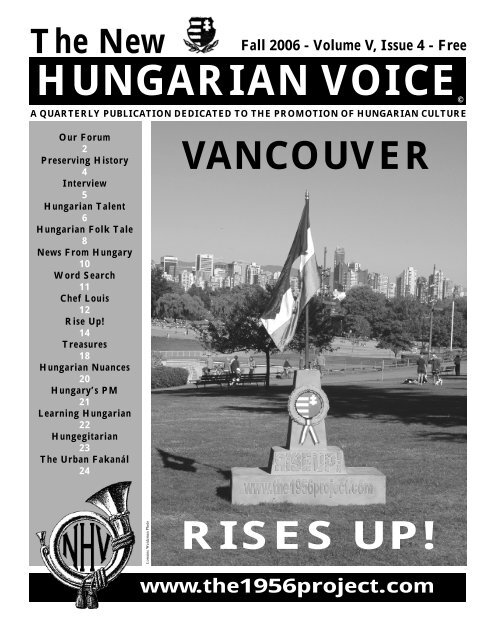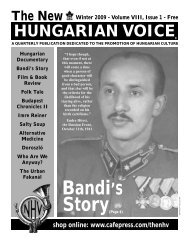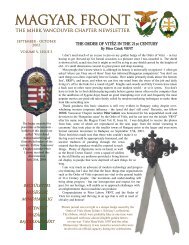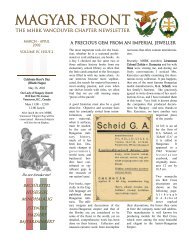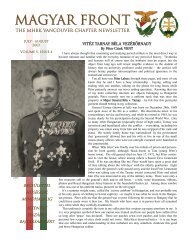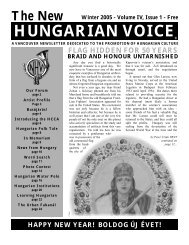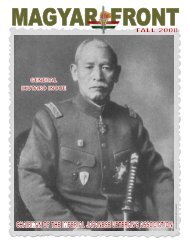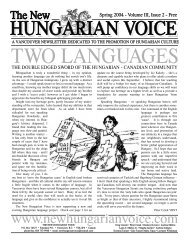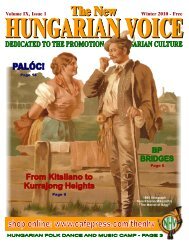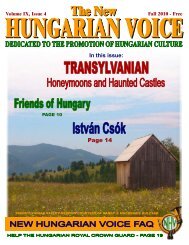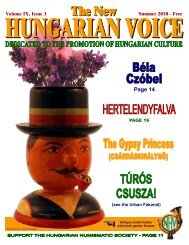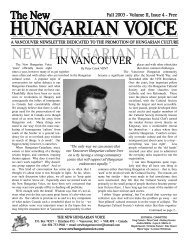THE NEW HUNGARIAN VOICE FALL 2006 (Read-Only)
THE NEW HUNGARIAN VOICE FALL 2006 (Read-Only)
THE NEW HUNGARIAN VOICE FALL 2006 (Read-Only)
You also want an ePaper? Increase the reach of your titles
YUMPU automatically turns print PDFs into web optimized ePapers that Google loves.
The New<br />
Fall <strong>2006</strong> - Volume V, Issue 4 - Free<br />
<strong>HUNGARIAN</strong> <strong>VOICE</strong><br />
©<br />
A QUARTERLY PUBLICATION DEDICATED TO <strong>THE</strong> PROMOTION OF <strong>HUNGARIAN</strong> CULTURE<br />
Our Forum<br />
2<br />
Preserving History<br />
4<br />
Interview<br />
5<br />
Hungarian Talent<br />
6<br />
Hungarian Folk Tale<br />
8<br />
News From Hungary<br />
10<br />
Word Search<br />
11<br />
Chef Louis<br />
12<br />
Rise Up!<br />
14<br />
Treasures<br />
18<br />
Hungarian Nuances<br />
20<br />
Hungary’s PM<br />
21<br />
Learning Hungarian<br />
22<br />
Hungegitarian<br />
23<br />
The Urban Fakanál<br />
24<br />
VANCOUVER<br />
Lorraine Weideman Photo<br />
RISES UP!<br />
www.the1956project.com
EDITOR<br />
ART DIRECTOR<br />
Peter Czink VRNT<br />
CONTRIBUTING EDITOR<br />
MARKETING AND<br />
SUBSCRIPTIONS<br />
Lorraine Weideman<br />
CONTRIBUTING EDITORS<br />
Greg Csiszár<br />
Mike Pratt<br />
Anita Rácz<br />
Magda Sasvári<br />
Andrea Szilágyi<br />
WEBMASTER<br />
Rodney Kovács<br />
ACCOUNTING<br />
Mária Vajna<br />
DISTRIBUTION<br />
Kristina Tanner<br />
Zale Tanner<br />
P.O. Box 74527<br />
Kitsilano P.O.<br />
Vancouver, B.C.<br />
V6K 4P4 Canada<br />
604 733-9948<br />
newhungarianvoice@hotmail.com<br />
www.newhungarianvoice.com<br />
Published by<br />
The New Hungarian Voice<br />
Editorial Committee<br />
© <strong>2006</strong><br />
All rights reserved<br />
OUR FORUM<br />
POINTS OF VIEW FROM <strong>THE</strong><br />
<strong>HUNGARIAN</strong>-CANADIAN COMMUNITY<br />
Most of us have heard of the situation in<br />
Hungary today – the Prime Minister confessed<br />
to lying to the people, and Hungarians took to<br />
the streets, demanding his resignation. After<br />
following due process, the Hungarian powersthat-be<br />
voted to keep him in his position for<br />
the time being, and we will have to wait and<br />
see how the situation unfolds.<br />
Personally, I am very saddened by the state<br />
of affairs, and although we Canadians are<br />
known for being somewhat apathetic about<br />
our own political matters, I feel that ours is a<br />
kinder, more tolerant condition. At least we<br />
haven’t made a habit of executing our fallen<br />
political leaders. If I lived in Hungary, I think<br />
I would take to the streets too – perhaps make<br />
signs and definitely publish broadsides, but<br />
I’d leave the cobblestones where they belong.<br />
Ever since the events in Hungary began, my<br />
inbox has been overflowing with email from<br />
Hungarian immigrants, mainly from Canada<br />
and the US, urging me to despise the Hungarian<br />
PM and to blame the nation’s woes on the<br />
past decades of communism. There has even<br />
been the prerequisite poetry, some of which<br />
pleads to God to deliver us Magyars from the<br />
evil Ferenc Gyurcsány.<br />
Some of my old friends who lean to the<br />
right are horrified that the current Hungarian<br />
government has sold off the country’s<br />
treasured iconic national businesses, but have<br />
forgotten how they wildly beat the drum of<br />
capitalism for decades. All of those red stars<br />
that were removed from buildings have been<br />
replaced with McDonald’s and Coca-Cola<br />
advertisements, and the current government,<br />
supported by a great many Hungarians,<br />
mimics its Western counterparts.<br />
The communists have become capitalists.<br />
Fifty years of Western rhetoric has turned the<br />
Hungarian Revolution into a crusade against<br />
communism, even though the Uprising was<br />
about oppression and occupation, initiated and<br />
led by idealistic communists. Hungarian<br />
immigrants still write maudlin verses and<br />
appeal to the world to remember their plight,<br />
yet we don’t speak up against the occupation<br />
of sovereign nations today.<br />
And who would have been able to guess<br />
that a politician would be capable of lying to<br />
his own people Or of manipulating the<br />
electorate<br />
I still am unsure, however, of what I can do<br />
from here. The emails still keep coming, and<br />
2<br />
although I’m convinced that the PM is a<br />
no-good so-and-so, no one has offered me a<br />
recommendation on what to do. In fact, the<br />
emails generally come from immigrants who<br />
have watched the decline of their Hungarian-<br />
Canadian institutions and witnessed the<br />
collective disinterest in their culture by their<br />
offspring. Across Canada and the States, their<br />
cultural sinking ship has often been captained<br />
by people who lack vision and cling to near<br />
extinct methods and ideologies.<br />
Criticizing leadership in our immigrant<br />
community is strictly taboo – but constant<br />
complaining about far-off Hungary is part of<br />
the game – like a bowler who tries to direct<br />
the ball with shouts and gestures as it rolls<br />
down the alley. While around us, our institutions<br />
slowly crumble from lack of attention.<br />
I’m still waiting for one of these internet<br />
political critics to email me the magic<br />
solution. In the meantime, I think I’ll stick<br />
with my plan of doing the best I can to<br />
improve the cultural situation around me. Not<br />
long ago, I suggested to one of the leaders of a<br />
half-century-old immigrant Hungarian organization<br />
that I am intensely involved with, that<br />
we publish an article dealing with the<br />
challenges we are facing, as well as the<br />
solutions. My venerable mentor would have<br />
none of it, as he felt that “people would laugh<br />
at us” if we admit that things need to be overhauled<br />
and updated.<br />
I don’t think there’s any shame in<br />
admitting that we need to do better – to throw<br />
away out-dated ideas and embrace better ones.<br />
If we truly want to help Hungary, the best<br />
thing we can do is set an example – to work<br />
hard in bettering our immediate situation and<br />
to communicate our goodwill and cultural<br />
integrity with the people around us and to<br />
those in Hungary as well.<br />
Politically, we Canadians might be a little<br />
less passionate, but perhaps, as Hungarian-<br />
Canadians we can teach our people back in<br />
the homeland something valuable. There will<br />
always be a right and a left, and each has its<br />
own virtues and prejudices. Is it productive to<br />
dismiss one or the other because of inherited<br />
loyalties or simple closed-mindedness<br />
Politics and passion will always go handin-hand,<br />
but a little laid-back Canadian<br />
tolerance will go a long way in ensuring a<br />
more peaceful community.<br />
Peter Czink
NOW AVAILABLE<br />
<strong>THE</strong> 1956 <strong>HUNGARIAN</strong> REVOLUTION<br />
A PEOPLE’S SACRIFICE<br />
A 64-page publication packed with exclusive articles and never<br />
before published photographs. Personal accounts of the<br />
Uprising, technical details and political introspection are<br />
combined with a fresh look at the events of 1956.<br />
Featuring a Revolutionary chronology, biographies, photographs<br />
of artifacts, diagrams, facts and figures, emblems and<br />
symbolism, and rare documents.<br />
A PERSONAL VOYAGE<br />
An honest and engaging account of one man’s 1956 experience.<br />
MAKING HISTORY<br />
Accompany a bona fide Revolutionary through the streets of 1956 Budapest.<br />
<strong>THE</strong> RE-BIRTH OF <strong>THE</strong> NATIONAL GUARD<br />
An academic article on the plans for the Revolutionary National Guard.<br />
INSIGNIA OF <strong>THE</strong> NATIONAL GUARD<br />
Signs and symbols that inspired a nation.<br />
PERSPECTIVES OF <strong>THE</strong> REVOLUTION<br />
An overview of how the Uprising looked to Canadians of the 1950s<br />
RADIO FREE EUROPE – DEMOCRACY AND DESTABILIZATION<br />
A detailed account of the West’s encouragement of aggression.<br />
WHAT CANADA CAN DO<br />
An overview of what Canadians were doing to help Hungarians at home and in Canada.<br />
CLOSE-COMBAT IN <strong>THE</strong> STREETS OF BUDAPEST<br />
Revolutionary weapons and tactics.<br />
HOW WE LOOKED<br />
Through the eyes of the immigrants, the West, Communists and the Soviets.<br />
SIFTING THROUGH <strong>THE</strong> MICROCOSMIC <strong>FALL</strong>OUT<br />
The very personal journey of a child of 1956 immigrants.<br />
Although our booklet is free of charge and has been<br />
produced by volunteers, we gratefully accept donations -<br />
100% goes toward printing and mailing costs.<br />
To order our publication, send your donation to:<br />
<strong>THE</strong> <strong>NEW</strong> <strong>HUNGARIAN</strong> <strong>VOICE</strong><br />
P.O. Box 74527 Kitsilano PO<br />
Vancouver, BC Canada V6K 4P4<br />
Please make your cheque payable to The New Hungarian Voice<br />
(The minimum needed to cover postage costs are $5.00 within Canada,<br />
$8.00 to the USA and $14.00 overseas)<br />
www.the1956project.com
PRESERVING HISTORY<br />
It’s not everyday that you have the opportunity to do your<br />
part in preserving history. The opportunity to ensure that it is<br />
perpetually accessible is even rarer. During the last couple of<br />
years I have been collecting artifacts pertaining<br />
to the 1956 Hungarian Revolution<br />
for my exhibition at the downtown<br />
Vancouver Public Library, and I have had<br />
the good fortune to acquire a great many<br />
very rare pieces. My intention was to<br />
share these finds with the public, and<br />
judging by the initial response, it seems<br />
that the exhibition has touched a great<br />
many people.<br />
Some time ago, I bought a collection of<br />
original revolutionary newspapers published<br />
during the Uprising, many of which<br />
are on display. They came from an attic<br />
in Hungary – hidden away since 1956,<br />
and brought out only when their original<br />
owner heard that I was in the market for<br />
historically significant artifacts. They had<br />
belonged to an activist who had been<br />
involved with the Uprising from the very<br />
beginning, and among the papers were a<br />
torn, type-written page and a small handwritten<br />
note.<br />
I recognized them immediately – it<br />
would be hard for any Hungarian Revolution buff to miss – a<br />
copy of the famous 16 Points, written a day before the Revolution,<br />
along with some hand-written amendments.<br />
Items from the 1956 Revolution are quite scarce. Even the<br />
official emblems of the time only existed from 1949 until 1956,<br />
so one can imagine how anything from those few days of the<br />
Uprising would be rare indeed. Immediately following the<br />
Revolt, it would have been very unwise to<br />
hang on to anything revolutionary, as the<br />
authorities were doing their best to extinguish<br />
the flames of rebellion.<br />
These documents, therefore, could be<br />
considered among the earliest from the<br />
Uprising, as well as among the rarest.<br />
The poor quality pulp paper of the time<br />
ensured that they would quickly become<br />
ephemeral pieces of history. I mentioned<br />
these items to the Military History Institute<br />
and Museum in Hungary, and they<br />
expressed great interest in them.<br />
After giving the matter considerable<br />
thought, I realised that they would be<br />
difficult to display them here at the library<br />
– they are small and fragile, and would be<br />
lost among the artifacts we already have<br />
exhibited. I also thought that such a rarity<br />
belongs where it can be cared for the best,<br />
and where it can always be accessed. It<br />
belongs back home.<br />
Collecting antiques is a very enriching<br />
and rewarding pastime – holding history<br />
in your hands can connect you to something quite sublime, but<br />
there are also times when “putting something back where you<br />
found it” can be even more satisfying.<br />
Peter Czink<br />
4
The<br />
NHV<br />
INTERVIEW<br />
János Miska is a librarian by profession<br />
but he is also known for his books of<br />
stories, essays, translations, anthologies<br />
and bibliographies. After graduation<br />
from the University of Budapest,<br />
McMaster University and the University<br />
of Toronto, he served as a librarian at<br />
the University of Manitoba and Agriculture<br />
Canada. He retired from the latter<br />
in 1991 as regional director of research<br />
libraries. He is the founding president of<br />
the Hungarian - Canadian Authors’<br />
Association and editor of its anthology<br />
series. János is a recipient of several<br />
grants and honours, and for his many<br />
years of scholarly accomplishments he<br />
was inducted into the Hungarian<br />
Academy of Sciences in 2004. He lives<br />
in Victoria, B.C. with his wife, Marie.<br />
What is the most significant memory<br />
of the 1956 Hungarian Revolution<br />
One of my favourite subjects at school<br />
was history. A subject that had proved to<br />
me time and time again that revolutions<br />
seldom solved nation’s essential<br />
problems. Our timid demonstration,<br />
announcing fraternal loyalty to our Polish<br />
and East-German brothers, had turned<br />
into a full-fledged Revolution. Would<br />
history repeat itself<br />
How has the Uprising been<br />
commemorated locally in the past<br />
The commemorations from the outset<br />
acted as a unifying force. Many generations<br />
have joined forces in paying tribute<br />
to the spirit of the Uprising. The earlier<br />
commemorations were more forceful,<br />
more political and emotional. The<br />
wounds were fresh. Hungary was occupied<br />
by a foreign power. In response,<br />
passionate speeches were held, denouncing<br />
the atrocities of the government.<br />
Demonstrations were held in front of the<br />
Soviet Embassy in Ottawa, and the<br />
national and local media carried long<br />
articles about the Revolution. It was the<br />
early commemorations that kept the spirit<br />
of the Uprising alive. The nature of the<br />
remembrances has shown a dramatic<br />
change after the withdrawal of the Soviet<br />
forces from Hungary. The replacement<br />
of the one-party communist system with<br />
a freely elected government, and the<br />
official recognition of the Revolution<br />
have made the commemorations historical,<br />
rather than political. Still, the spirit<br />
of the early commemorations prevails to<br />
this day. We keep paying homage to the<br />
heroes and martyrs of 1956 at local<br />
memorials.<br />
János Miska<br />
How will Victoria commemorate the<br />
50th anniversary of the Uprising<br />
The Hungarian-Canadian community<br />
across the nation has been full of<br />
commemorative spirit throughout the<br />
year. In Victoria, a small committee had<br />
been appointed to find an auditorium, to<br />
draft letters of invitation to Federal,<br />
Provincial and Municipal dignitaries, and<br />
create a program for the occasion. The<br />
commemoration in Victoria will start on<br />
October 22nd, when we will pay tribute<br />
to the heroes and martyrs of the Uprising<br />
at the memorial park. A short program<br />
will follow in the Hungarian Cultural<br />
Centre along with a photo exhibition.<br />
The official remembrance will take place<br />
on October 23rd at the Conservatory of<br />
Music. The program will also include<br />
5<br />
film presentations and an exciting<br />
performance by the Greater Victoria<br />
University Orchestra.<br />
Do you think it is important that<br />
future generations learn about 1956<br />
I most certainly do. From a personal<br />
point of view, the Revolution will help<br />
future Hungarian-Canadian generations<br />
realize that the Uprising was a pivotal<br />
event in history that brought them to<br />
Canada. From an intellectual point of<br />
view, they will gain an understanding of<br />
the nature of oppression and will learn to<br />
recognize it in their lives when they see<br />
it.<br />
What is the most essential lesson<br />
we can learn from the Uprising<br />
The revolution was about freedom.<br />
Political oppression is harmful. It takes<br />
away the individual’s hope for selfbetterment.<br />
Hope is an essential element<br />
of survival.<br />
Shouldn’t we be more outspoken<br />
against the oppression of other<br />
sovereign nations today<br />
Yes, we should be. And we should be<br />
outspoken early enough to prevent<br />
catastrophic events like the ones in<br />
Somalia, Kosovo or Iraq. We should use<br />
every peaceful means to educate the<br />
oppressing governments, convince them<br />
that the practice of noblesse oblige<br />
applies to everyone.<br />
Is violence the only way to deal<br />
with an oppressive government<br />
No, violence is not the only way to deal<br />
with oppressive governments. There are<br />
examples in history showing that<br />
oppression can be dealt with through<br />
peaceful negotiation by offering amnesty<br />
or easing the oppression. We never even<br />
dreamed of waging an armed rebellion<br />
against a powerful political empire. The<br />
peaceful method, of course, depends on<br />
the nature and strength of the oppressive<br />
government, and upon the strength and<br />
determination of those oppressed.
<strong>THE</strong> TALENT AMONG US<br />
HAJNALKA MANDULA<br />
Vancouver’s Most Natural Designer<br />
Hajnalka Mandula spends lots of time on the telephone these<br />
days. She has been featured by countless fashion writers<br />
(including ELLE and The Globe and Mail) as well as CBC<br />
Radio. Her clothing is of the most natural fabric and woven<br />
with the most intricate designs. Hajnalka’s motivation lies in<br />
using only natural, certified organic materials. She makes use<br />
of the purest wool, cotton, silk and linen and her materials are<br />
cultivated without the use of pesticides. But much of her<br />
inspiration comes from hemp: stronger material widely used in<br />
her home country of Hungary.<br />
There is no question hemp lasts. Hajnalka showed me a 120<br />
year-old hand-woven hemp cloth from Transylvania which<br />
appeared as fresh as it was at the end of the 19 th century. She<br />
first noticed the material in the closets of her grandparents in<br />
Hungary, who proudly kept their own wardrobe of fitted and<br />
elegant hemp clothing. Unfortunately, according to the<br />
designer, hemp production has been illegal in Canada. This has<br />
deprived people of a natural, long-lasting and beautiful material.<br />
But what the Western world has ignored, Hajnalka is putting on<br />
the map, with style.<br />
Hajnalka was born in Debrecen, Hungary and came to<br />
Vancouver in 1990. As a nature-loving young girl, she first<br />
wanted to come to Canada when she saw a picture book of<br />
Vancouver. It would seem only natural that she feels at home<br />
here - in a city with environmental consciousness. Upon her<br />
arrival, she began modeling but soon enrolled in school - a yearlong<br />
design program at Helen Lefeaux. Her travels have taken<br />
her to numerous fashion capitals, such as Milan and New York,<br />
but she has chosen to stay in Vancouver for her newly opened<br />
downtown boutique.<br />
Her store has been open since mid-September of this year. It<br />
is a spacious room, in an older building decorated along the<br />
perimeter with hand-made earthy-toned garments on open<br />
hangers. Hajnalka’s approach is to design each piece as an<br />
individual, matchless work of art. Upon closer look, her clothing<br />
appears cultivated - each with Hajnalka’s personally woven<br />
signature. It is the bulk, mass-produced nature of many other<br />
clothing brands which she has learned to dislike and avoid.<br />
While she admits that leaving Hungary was a painful<br />
decision, Hajnalka does not regret it for a moment. Her life in<br />
Vancouver has also allowed her travel opportunities within and<br />
outside of North America. But she has aspirations which<br />
include expanding her brand and opening boutiques in California<br />
and perhaps Hungary. Currently, aside from a boutique and<br />
work studio in Vancouver, Mandula designs have distribution in<br />
many major centers such as New York, Los Angeles and Miami.<br />
Hajnalka also believes that it is important for people to learn<br />
more about organic clothing, and hemp in particular. Just as<br />
organic food and groceries have reached new popularity in<br />
recent years, Hajnalka Mandula hopes for a similar trend to<br />
continue breaking ground in the fashion industry.<br />
Greg Csiszár<br />
...from Mandula’s<br />
Spring Collection...<br />
For more information you can visit her store at 882 Homer Street in downtown Vancouver,<br />
phone 604 720-3787 or check out her website: www.mandula.com<br />
6<br />
Justin Adam Photo
An Orchestral Tribute to 1956<br />
Friday, October 20th, <strong>2006</strong> 8:00pm<br />
A spectacular concert by the<br />
West Coast<br />
Symphony Orchestra<br />
performing works by<br />
Hungary’s most notable composers<br />
Conducted by Les Dala<br />
Les Preludes - Franz Liszt<br />
Piano Concerto Number 3 – Béla Bartók<br />
Intermission<br />
Hungarian Rhapsody Number 2 – Franz Liszt<br />
Peacock Variation – Zoltán Kodály<br />
Christ Church Cathedral<br />
690 Burrard Street, Vancouver BC<br />
Admission by Donation<br />
(Recommended Donation $20.00)<br />
To reserve tickets call 604 689-3081<br />
7
Once there was,<br />
where there wasn’t,<br />
even beyond the Operencia<br />
Sea, and even beyond the Glass<br />
Mountains, there was a ruined furnace<br />
without a side. Where it was good, it was not bad, and<br />
where it was bad, it was not good. Beside a bare mountain,<br />
farther than the back of beyond, there was a river, and on its<br />
bank an ancient, hollow willow tree, and on every branch was<br />
a ragged, tattered skirt. In each hem was a horde of fleas –<br />
and let he who does not heed my story become the herdsman<br />
of those fleas. And if just one gets away, let him be<br />
consigned to the blood-letting of that horde of fleas and be<br />
bitten to death.<br />
Once upon a time, there was, in fact, a very, very old<br />
woman in this world. She was older than the highway, and<br />
even older than God’s old gardener. The woman never once<br />
thought - not even when she was saying sand instead of hand<br />
- that she would one day have to die. Instead, she hurried and<br />
scurried after wealth. She was always on the lookout, sweeping,<br />
scouring, and trying to swallow the whole world! She<br />
had no one, not even one as big as my thumb. Her efforts<br />
were fruitful, for in the end she feathered her nest, amassed a<br />
fortune, and no longer wanted for anything. She had in her<br />
house a small axe, a big axe - everything!<br />
Then one day, Death came and called on her to take her<br />
away. The old woman was reluctant to part with her wealth,<br />
so she pleaded with Death not to take her away just yet. She<br />
begged for ten more years, or five, or even just one! But<br />
Death wasn’t about to compromise:<br />
“You’d better get ready because if you will not come<br />
freely, I shall simply take you.”<br />
Still, the old woman wouldn’t give up, and she begged and<br />
pleaded some more. Death was unmoving and said that he<br />
had already entered her name in the big book, and that there<br />
was nothing he could do about it.<br />
In the end, she pleaded so much that Death gave in - sort<br />
of - and said, “Very well, then. I don’t mind. I’ll give you<br />
three hours.”<br />
“But that is so little!” whined the old woman, “Please! Just<br />
come back tomorrow!”<br />
“Not on your life,” replied Death.<br />
“Oh, come on!”<br />
“Impossible!”<br />
“Please!” The woman was used to getting her way, and<br />
she knew that if she were persistent enough, Death would<br />
give in. And he did - sort of.<br />
“Well,” Death said. “If it means that much to you. What<br />
do I care!”<br />
The woman smiled on the inside and said, “Just one more<br />
<strong>HUNGARIAN</strong> FOLK TALES<br />
TRANSLATED and retold by andrea szilÁgyi<br />
Death and the old woman<br />
little thing…write here on the door that you will not come<br />
until tomorrow. I shall be more at ease if I can see it written<br />
on the door.”<br />
Death was exasperated by now and didn’t want to waste<br />
any more time, so he took some chalk from his pocket, wrote<br />
“tomorrow” on the door, and with that, went off on his way.<br />
The next morning, after sunrise, Death came to the old<br />
woman’s door and found her still under the quilt.<br />
“Now! Come with me!” commanded Death.<br />
“It is not time,” replied the woman. “Look what it says on<br />
the door.”<br />
Death looked and saw the writing there: “tomorrow” it<br />
said.<br />
“Very well, then, I will come tomorrow!” And he sidled<br />
away.<br />
Death kept his word, and the next day he came again to the<br />
woman’s house, and again, he found her still in bed.<br />
“Now! Come with me!” commanded Death.<br />
“It is not time,” replied the woman. “Look what it says on<br />
the door.”<br />
Death looked and saw the writing there: “tomorrow” it<br />
said.<br />
On the third day, Death came knocking again, and again<br />
the woman said, “It is not time. Look what it says on the<br />
door.”<br />
By now, Death began to tire of the game and said to the<br />
woman, “Now, you shall deceive me no more!” And with that,<br />
he wiped the writing off the door. “Mark my words, tomorrow<br />
I shall come for you and take you away!”<br />
And as the old woman watched Death slink away, her<br />
shoulders drooped more and more. She could see now that<br />
the next day, like it or not, she would have to die. This made<br />
her very frightened, and she began to shiver, though it was<br />
warm.<br />
The next day, as morning approached, she did not know<br />
what to do with herself, she was so terrified. She would have<br />
hidden from Death in an empty bottle, if she could. She<br />
searched and searched for a place to hide. Then…there, in the<br />
pantry, was a barrel of liquid honey. She sat in it so that only<br />
her eyes and nose were showing.<br />
“But what if he finds me here” she said to herself. “It<br />
would be better to hide in the quilt.”<br />
So she climbed out of the honey and hid among the feathers<br />
in the quilt. But, she did not care for that either - they<br />
poked her. So, she decided to come out and look for a better<br />
hiding place. Just as she did so, in came Death, who could not<br />
think what on earth that feathered monster might be. He was<br />
so alarmed by it that he ran away in fright.<br />
Perhaps even to this day he has not gone back to take the old<br />
woman away.<br />
This story is based on a folktale from A mindent látó királylány/The Princess That Saw Everything:<br />
Twenty-four Hungarian Folk Tales (1998). This is bilingual book, with translations by Bernard Adams.<br />
8
Claiming a<br />
Revolutionary<br />
Inheritance<br />
Monday<br />
October 23rd,<br />
7:00pm<br />
A two-hour<br />
presentation of<br />
speakers, personal<br />
reminiscences, historical<br />
overview and commentary<br />
Featuring<br />
National Film Board of Canada short films<br />
This is a Photograph<br />
and<br />
Revolution’s Orphans<br />
7:00pm - 9:00pm<br />
Free<br />
Admission<br />
Alice MacKay Room - Vancouver Public Library<br />
350 West Georgia Street Vancouver, BC<br />
Courtesy Pacific Newspaper Group
<strong>NEW</strong>S<br />
FROM HUNGARY<br />
by Magda Sasvári<br />
POPULARITY OF PRIME<br />
MINISTER AND SUPPORT FOR<br />
MSzP ON <strong>THE</strong> DECLINE<br />
<strong>2006</strong>.VIII.03.<br />
In the month of July, when Prime<br />
Minister Gyurcsány and Economy<br />
Minister János Koka announced the<br />
New Balance austerity package, their<br />
popularity dropped by 12 %.<br />
MAMMOTH REMAINS FOUND<br />
IN SOU<strong>THE</strong>RN HUNGARY<br />
<strong>2006</strong>.VIII.14.<br />
The remains of a mammoth have<br />
been found near the town of Zok in<br />
southern Hungary, an expert from the<br />
institute of geography at the University<br />
of Pécs said. The skull, a 150cm piece<br />
of tusk and several of the animal’s teeth<br />
were found on a hill covered with vineyards.<br />
The remains of the prehistoric<br />
animal, which lived between 10,000 and<br />
18,000 years ago, will be covered with a<br />
special glue for protection before being<br />
transferred to the university for further<br />
analysis.<br />
HUNGARY’S INFLATION<br />
MAY HAVE ACCELERATED<br />
<strong>2006</strong>.VIII.14<br />
Hungary’s inflation rate probably<br />
rose to the highest this year after oil<br />
soared, making it more likely the<br />
Central Bank will keep raising interest.<br />
Consumer prices may have risen 2.9%<br />
from a year earlier, after increasing 2.0<br />
% in June. Crude oil near $77.00 a<br />
barrel has driven up everything from<br />
utility bills and transportation to food.<br />
Hungary has the highest interest rates in<br />
the European Union.<br />
DANUBIUS HOTELS<br />
GETS BUYOUT OFFER<br />
<strong>2006</strong>. VIII.14.<br />
Danubius Hotels, Eastern Europe’s<br />
second largest hoteliers, received a<br />
buyout offer from CP Holdings Ltd. for<br />
5,625 HUF ($27.00) a share. CP Holdings,<br />
based in London, already has 5.3%<br />
in Danubius. The shares jumped as<br />
much as 5.2% after the announcement<br />
and closed 3.5% higher at 6,000 HUF in<br />
Budapest, valuing Danubius at 497<br />
billion HUF.<br />
ST. STEPHEN’S DAY<br />
CELEBRATION TURNS INTO<br />
DISASTER IN BUDAPEST<br />
<strong>2006</strong>, VIII.20.<br />
1.5 million people turned out to<br />
watch the St Stephen’s Day celebration<br />
fireworks in Budapest. A storm, with<br />
winds of 120km per hour, hit the<br />
people gathered on the shores of the<br />
Danube to watch the fireworks. Five<br />
people died, and three people were<br />
presumed to be drowned as they fell<br />
overboard after colliding with other<br />
boats. Officials say that more than 500<br />
people were injured.<br />
<strong>HUNGARIAN</strong> STUDENT<br />
BEATEN IN SLOVAKIA<br />
<strong>2006</strong>. VIII 24.<br />
Unknown attackers beat a Hungarian<br />
girl attending the University of Nyitra,<br />
and they wrote anti-Hungarian slogans<br />
on her shirt. It happened in one of the<br />
underground passages in Nyitra and it<br />
was provoked by the girl speaking in<br />
Hungarian on her cell phone. After the<br />
beatings they wrote on her blouse<br />
“Hungarians get out of here to the other<br />
side of the Danube,” and “Death to all<br />
parasites.” She was taken to hospital in<br />
Nyitra with internal bleeding.<br />
A second incident involved a 19<br />
year-old man, who was attacked in<br />
Diószeg on August 26th. The incidents<br />
have been increasing since a far right<br />
member of the Slovak government, Jan<br />
Slota, made remarks about the ethnic<br />
minority Hungarians in Slovakia.<br />
POET AND WRITER GYÖRGY<br />
FALUDY PASSES AWAY<br />
<strong>2006</strong>.IX.1.<br />
György Faludy, born September<br />
22nd, 1910, in Budapest emigrated to<br />
France in 1938. Following the German<br />
occupation he escaped to Marocco, and<br />
in 1942 he left for the US. After the<br />
Second World War he returned to<br />
Hungary in 1950, where he was imprisoned.<br />
He was freed in 1953. Following<br />
10<br />
the 1956 Revolution he lived in London,<br />
Florence, Malta and Toronto. He<br />
returned to Hungary after 1989.<br />
His writings included Autumn Dew<br />
(Öszi harmat) and Prison Poems - a<br />
collection of 200 sonnets. He died<br />
before the publishing of his latest book<br />
On the Limbo of Hell.<br />
His many awards and prizes included<br />
the Kossuth Prize (1994), and the<br />
Pulitzer prize (1998). In Canada, the<br />
Hungarian Embassy announced the<br />
foundation of a memorial park in<br />
Toronto designed by architect Scott<br />
Orrence, that will be opposite Faludy’s<br />
former home.<br />
TAX INCREASES<br />
<strong>2006</strong>.IX.1.<br />
September 1st marks the increase of<br />
AFA (National Sales Tax) from 15% to<br />
20% on all goods in Hungary, including<br />
groceries. Also, fees will be introduced<br />
to healthcare in Hungary on January 1st,<br />
2007. Every time a person goes to a<br />
clinic, to the doctor’s office, or to a<br />
hospital, they will have to pay 300 HUF<br />
daily. These fees may increase or<br />
decrease depending on the necessity of<br />
the visit. Further fees may be introduced.<br />
UN REGIONAL FOOD AID<br />
OFFICE MOVING TO BUDAPEST<br />
<strong>2006</strong>.IX.7.<br />
The Food and Agriculture Organisation<br />
of the United Nations will relocate<br />
its offices from Rome to Budapest in<br />
January 2007, Hungarian Agricultural<br />
Minister, József Gráf announced. It will<br />
also open a Human Resources and<br />
Banking service for the UN in Europe,<br />
Africa and the Middle East, starting<br />
September 2007. Hungary will contribute<br />
a one-time amount of 200 million<br />
HUF.<br />
BRATISLAVA, SLOVAKIA<br />
BANS <strong>HUNGARIAN</strong> RALLY<br />
<strong>2006</strong>.IX.12.<br />
The rally had been planned by<br />
Hungarians to protest anti-Hungarian<br />
incidents in Slovakia. The municipality
of Bratislava banned the rally, scheduled<br />
for September 16, on the request of<br />
police, who fear the rally may turn<br />
violent. There are 500,000 Hungarians<br />
living in Slovakia.<br />
4,000 PROTEST IN BUDAPEST,<br />
OUTSIDE PARLIAMENT<br />
<strong>2006</strong>.IX.16.<br />
The demonstration by a group representing<br />
families, protested against the<br />
newly introduced tax increases and<br />
charges for health services and education<br />
introduced by the government to<br />
curb the country’s huge deficit. “These<br />
measures hit the most vulnerable, and<br />
they increase the burdens of families,”<br />
said Ádám Török, general secretary of<br />
the Association of Families.<br />
THOUSANDS DEMONSTRATE<br />
DEMANDING RESIGNATION OF<br />
PM FERENC GYURCSÁNY<br />
<strong>2006</strong>.IX.24.<br />
The demonstrations started Sunday,<br />
September 17th, when the media aired<br />
and broadcasted a leaked tape of the<br />
Prime Minister’s speech to his Socialist<br />
Party members. The speech was made<br />
immediately after the present government’s<br />
winning re-election in April of<br />
this year. He stated that their win had<br />
been based on lies about the economy of<br />
the country. To quote the prime minister,<br />
“We lied morning, noon and<br />
evening,” “we surpassed the capacities<br />
of the country, … and we did nothing<br />
for the past four years.”<br />
By next morning, the people of<br />
Hungary, already suffering from the<br />
introduction of new and increased taxes,<br />
took to the streets demanding the resignation<br />
of the Prime Minister and the<br />
government. By the same evening the<br />
number of peaceful demonstrators rose<br />
to the tens of thousands. A renegade<br />
group of a few hundred marched toward<br />
the national television station, trying to<br />
force entry to the building in order to be<br />
able to announce their demands. They<br />
stormed the building, breaking glass and<br />
furniture and forcing the police to fight<br />
back with tear gas and flare guns. About<br />
150 people were injured, many of them<br />
policemen.<br />
The demonstrations continued all<br />
week in front of the parliament. Clashes<br />
between some demonstrators and the<br />
police left 250 people injured, and 200<br />
arrested. Both Tuesday and Wednesday,<br />
over 10,000 people gathered in front of<br />
the parliament, still demanding the<br />
resignation of the Prime Minister. The<br />
demonstrations continued Thursday, and<br />
Friday, but without incident.<br />
The country nervously waited for<br />
Saturday, September 23, the day that<br />
had been planned months before by the<br />
opposition party’s leader, Victor Orbán<br />
for the FIDESz party to hold a public<br />
meeting, where hundreds of thousands<br />
of party faithful and sympathizing<br />
citizens were expected to meet on<br />
Kossuth Square in front of the parliament.<br />
However, the anxiously expected<br />
meeting was cancelled by FIDESz party<br />
president László Kövėr, as a result of a<br />
bomb threat and on the request of the<br />
police who said that they will not be<br />
able to handle a crowd of 200,000.<br />
Victor Orbán, the leader of FIDESz<br />
postponed the meeting until after October<br />
1st, when he will again call a public<br />
meeting after the results of the local<br />
governments’ elections will be known.<br />
Sources:Figyelönet,<br />
Budapest online, Magyar Nemzet<br />
Hungarian Word Search<br />
By<br />
andi<br />
szilÁgyi<br />
Hungarian Names<br />
(male)<br />
Ádám<br />
Ákos<br />
Attila<br />
Béla<br />
Csaba<br />
Dénes<br />
Ferenc<br />
Frigyes<br />
Gábor<br />
Gyula<br />
Huba<br />
Imre<br />
István<br />
József<br />
Kálmán<br />
Karcsi<br />
László<br />
Levente<br />
Miska<br />
Robi<br />
Sándor<br />
Soma<br />
Szabolcs<br />
Tibor<br />
Zsolt<br />
K A F J G B I S B R T G Z E S<br />
Q X M Y G F C S O F T G T O H<br />
M G U O J Q E D C Y D N K L U<br />
A L S S S Z N R J R E A I Z B<br />
A T T I L A S O E V A M F S A<br />
I M W K S J Z C E N R K T A S<br />
S A D A M S V L L E C U L L E<br />
T C E X E C B D T O O O O A Y<br />
V H S F C S A B A G B B S Z G<br />
A A K S I M I D M A D A Z T I<br />
N N A M L A K Z R B M E Z V R<br />
B K K T J O B T T O E L N S F<br />
N J F K R R B Y J R B L C E O<br />
I P J B A E W A X O C I A O S<br />
X X K D A I B O R I B M T H R<br />
Solution on page 26… No peeking ‘til you’re done!<br />
11
later become an internationally renowned restaurant which he<br />
ran from 1963 to 1989. Although it was in an unpopular part of<br />
town, the Bakery’s reputation grew and it became famous for its<br />
CHEF LOUIS<br />
by Lorraine Weideman<br />
daily five-course meals and Chef Louis’ signature Beef<br />
Wellington. His enthusiastic personality dominated the dining<br />
room and business grew. Eventually, they were able to<br />
purchase the building and used the upper floors to house his<br />
ever-growing book collection.<br />
He and his wife ran their successful business, taught,<br />
lectured, wrote best-selling cookbooks and food columns in both<br />
English and Hungarian. He was determined to share his vast<br />
knowledge of the culinary world.<br />
Recently, while surfing the internet, I came across the His book collection was housed in thirty-one rooms above<br />
Culinary Archives and Museum website featuring wonderful old his restaurant, and included rare treasures dating back to 1490<br />
articles written by a gentleman named Chef Louis Szathmáry. that were kept in a special humidity-controlled room. He loved<br />
Some were from past issues of the Hungarian Heritage Review, his books, finding their appearance heart-warming, appreciating<br />
written between 1986 and 1988, highlighted by a poignant the craftsmanship, paper and design - the nuances of printing as<br />
quote: “I have always felt one of the most important things in much as the contents. He loved to hunt for new additions to his<br />
life was to give my acquired knowledge to the next generation.” collection in shops all over the world, taking great pleasure in<br />
Chef Louis did just that by sharing his passion for cooking, finding a rare item. He constantly referred to them for his<br />
educating and writing, along with his astounding book collection.<br />
He amassed one of the world’s finest culinary book and research projects.<br />
articles and books, and allowed others to access them for their<br />
ephemera collections that he later donated to universities and He would eventually amass one of the largest collections of<br />
museums.<br />
cookbooks, culinary literature and related artifacts. As his 70th<br />
He was born on June 2nd, 1919 in Budapest, Hungary. He birthday approached he and his wife decided to close The<br />
graduated in 1944 from the University of Budapest with a Bakery, sell the building and donate his personal collection to<br />
Masters degree in Journalism and a Ph.D. in Psychology. He institutions of learning. 15,000 items from his unique collection<br />
was quickly pressed into service as a psychologist in the went to the University of Iowa and Johnson and Wales College<br />
Hungarian Army, and part of his varied responsibilities were Culinary Archives and Museum.<br />
writing instruction manuals for field kitchens (known to His manuscripts and books relating to Franz Liszt, Bartók<br />
Hungarian soldiers as gulyás ágyúk or gulyás cannons) and mess and Kodály were donated to Boston University. The University<br />
procedures. In no time he added “cook” to his CV.<br />
of Chicago Library received the majority of his Hungarian<br />
After the war he spent time in various prison camps before language collection (including unique works on the Hungarian<br />
immigrating to America in 1951. He sailed from Bremerhaven, nobility, the origin and early history of the Hungarian nation,<br />
Germany to New York with a total of $1.10 in cash and a small the Turkish occupation and the history of Louis Kossuth and the<br />
suitcase that contained a few articles of clothing and fourteen Hungarian uprising of 1848-1849), along with close to 1,500<br />
books (mostly on Mozart, great Hungarian poets and his bible). volumes in German, Latin, French and English.<br />
He once wrote: “I can't recall a time when I did not have books He received many honours, including the Living Legend<br />
around me. My family in Hungary was rich in books, not award from the American Academy of Chefs, and others from<br />
money. We had a standing account with one book dealer that the James Beard Foundation, the Illinois Restaurant Association,<br />
had been active since the 1790s. It isn't strange, then, that I Food Arts magazine, and the József Venesz Lifetime<br />
grew up to become a book collector, although I never expected Achievement Award from the Hungarian Chefs Association.<br />
to own some 45,000 of them.”<br />
Before passing away on October 4 th , 1996, the prolific Chef<br />
He spent his first seven years in America in the New Louis wrote The Chef's Secret Cook Book, Sears Gourmet<br />
England area, working in a variety of jobs in the food industry. Cooking Forum, American Gastronomy, The Chef's New Secret<br />
In 1959 he moved to Chicago taking a position at Armour and Cook Book, and The Bakery Restaurant Cookbook. He was also<br />
Company as product manager and executive chef. He is the editor of the 15-volume Cookery America and Antique<br />
credited with improving the freeze-drying process that is used American Cookbooks, the Iowa Szathmáry Culinary Arts Series,<br />
by many food manufacturers today as well as for the Nelson Algren’s America Eats, as well as several books of<br />
development of the first flash frozen dinners for Stouffer’s. poetry written in Hungarian.<br />
He married Sadako Tanino in 1960, and in 1962 they opened Chef Louis Szathmáry, a life long scholar, restaurateur,<br />
a business called The Bakery. They started out baking high teacher, writer, philanthropist and dedicated collector, applied<br />
quality cakes for airlines, hotels and fine restaurants, and soon his voracious appetite for knowledge, life and learning to inspire<br />
grew into a little neighbourhood bakery and eatery that would everyone who knew him.<br />
12
To mark the 50th anniversary of the Hungarian Uprising, Pacific Cinémathèque, in conjunction with the Canadian Film<br />
Institute, the Embassy of the Republic of Hungary and Magyar Filmunió, presents a quartet of noted Hungarian feature<br />
films that deal, in differing narrative and stylistic ways, with the tumultuous events of October 1956 and their aftermath.<br />
The Unburied Man (A Temetetlen halott) Hungary/Slovakia/Poland 2004. Director: Márta Mészáros<br />
Friday, October 27 – 7:15pm Saturday, October 28 – 9:30pm<br />
Whooping Cough (Szamárköhögés) Hungary 1987. Director: Péter Gárdos<br />
Sunday, October 29 – 7:30pm Monday, October 30 – 9:25pm<br />
Eldorádó (aka The Midas Touch) Hungary 1988. Director: Géza Bereményi<br />
Saturday, October 28 – 7:30pm Sunday, October 29 – 9:15pm<br />
Time Stands Still (Megáll az idö) Hungary 1982. Director: Péter Gothár<br />
Friday, October 27 – 9:40pm Monday, October 30 – 7:30pm<br />
200 - 1131 Howe Street Vancouver, BC V6Z 2L7 24-Hour Film Information. 604 688-FILM (3456)<br />
email. info@cinematheque.bc.ca www.cinematheque.bc.ca<br />
MHBK<br />
VANCOUVER<br />
CHAPTER<br />
JOIN US!<br />
PO Box 74527<br />
Kitsilano PO<br />
Vancouver, BC<br />
V6K 4P4 • Canada<br />
604 733-9948<br />
czink@shaw.ca<br />
www.mhbk.com<br />
13
A unique exhibition of artifacts from<br />
the Hungarian Revolution on display for<br />
the first time in 50 years<br />
Artifacts exhibited on the<br />
library’s main level and 6th floor<br />
14
REVIVING <strong>THE</strong><br />
REVOLUTIONARY SPIRIT<br />
October 2nd - 31st, <strong>2006</strong><br />
Vancouver Public Library 350 West Georgia Street<br />
15
<strong>HUNGARIAN</strong><br />
LANGUAGE LINK<br />
Certified Translation Services<br />
Personal • Medical<br />
Legal • Technical<br />
and Immigration Matters<br />
ES<strong>THE</strong>R VITALIS<br />
Certified Translator<br />
English - Hungarian<br />
Hungarian - English<br />
#301 - 1717 West 13th Avenue<br />
Vancouver, B.C. V6J 2H2<br />
604 738-6869<br />
cel: 604 789-0027<br />
fax: 604 738-6805<br />
evital@shaw.ca<br />
www.evitalis.com<br />
ORBIS PICTUS HUNGARICUS - <strong>HUNGARIAN</strong> FOLK COSTUME<br />
During the First World War, the ‘Youth Contingent’ of the Hungarian Red Cross produced a<br />
series of 14 Hungarian folk costume postcards in a fold-out booklet for fundraising. The originals<br />
were executed in black ink by Jenő Horváth and each card measures 9cm x 14cm. On the back of<br />
each one was a description (which we have translated into English) and a space for correspondence.<br />
There was also a map of ‘old Hungary’ showing where the particular figure is from. Although<br />
reproductions of some of these images are often seen, the complete series of 14 cards is quite rare.<br />
<strong>HUNGARIAN</strong> NATIONAL<br />
COSTUME FROM<br />
PALÓC<br />
YOUNG BRIDE FROM RIMÓCZ<br />
She wears a red, fringed silk shawl on her head, and she is carrying<br />
rosemary and geraniums in her hands. Her blouse is white, and around<br />
her neckline, above the white frills, there is a red pearl necklace. Her<br />
vest is blue and lilac silk, with black braids and blue straps. Her skirt<br />
is light green silk with red edging at the bottom, while her apron is<br />
black silk with a red ribbon. Her handkerchief is white and her boots<br />
are red, with tiny yellow and black embroidery along the stitching.<br />
No.7<br />
Use crayons, felt pens, coloured pencils or watercolour paint to bring this Hungarian figure to life.<br />
If you want to cut it out and put it in a frame, slip a piece of black paper behind it so the print on the<br />
other side won’t show through! The complete set of 14 will be reproduced in the NHV.<br />
16
KÁROLY MÜHLBECK<br />
ANNA TUTSEK<br />
TREASURES<br />
FROM <strong>THE</strong><br />
COMMUTER TRAIN<br />
by<br />
Magda<br />
Sasvári<br />
At the beginning of the 20 th Century, Hungarian Anna Tutsek<br />
was writing popular adventures - fashionable adventures of<br />
Cilike were the predecessor to the well known North American<br />
Nancy Drew adventure books.<br />
Anna started writing for young ladies in Hungary at a time<br />
when the German language<br />
dominated literature in the<br />
Austro-Hungarian Empire.<br />
Vienna was considered the<br />
cultural centre for the educated<br />
and fashionably elite at the turnof-the-century,<br />
but by the late<br />
1880s Hungarian literature was<br />
slowly becoming more acceptable.<br />
Well known children’s author<br />
and editor Elek Benedek helped<br />
change popular attitudes by<br />
approaching the Hungarian Parliament<br />
for funding to support<br />
Hungarian language children’s<br />
literature. His lobbying had<br />
worked - they reviewed their<br />
discriminatory language policies and the Singer and Wolfner<br />
Publishing Company embraced the idea of taking on the task of<br />
publishing Hungarian language books for young adults. It was<br />
at this time that Anna Tutsek wrote her famous Cilike books<br />
that were to become the favourite reading material of a whole<br />
generation of impressionable young Hungarian girls.<br />
If we look at these books today, we can not help but notice<br />
their conservative and romantic tones, but at the time, Tutsek’s<br />
writings were bold and unusual, when women and young girls<br />
dressed in outfits that covered<br />
them from neck to toe. Her<br />
heroines’ behaviour influenced a<br />
generation of middle-class young<br />
ladies. She wrote seven books in<br />
the Cilike series (with titles like<br />
The Adventures of Cilike, Cilike<br />
in Short Dress, Cilike’s Engagement<br />
and Cilike as Bride). Each<br />
edition was anxiously awaited<br />
with great anticipation by girls<br />
from six to sixteen.<br />
Encouraged by the success of<br />
the Cilike books, Anna Tutsek<br />
wrote a number of books similar<br />
in nature, under the pen-name<br />
Mrs. Robert Tábori - The story of<br />
Viola, Little Miss Windstorm,<br />
Among the Mountains, The Last Girl from Pest, This Sweet<br />
Home, The Story of Ágnes and Katika’s Cookbook.<br />
In the 1930s, she started writing for the Weekly Hírlap and<br />
for the Hungarian Girls and Mothers Magazine. She contrib-<br />
18
uted to from 1934 to 1941, and in 1944 she compiled an album<br />
called 50 Years - The Hungarian Girls Album 1894-1944 that<br />
included the best stories written for young people during those<br />
years. Anna Tutsek was born March 12th, 1865 in Kolozsvár<br />
and died December 17th, 1944 in Budapest. Her career<br />
started with novellas but she is best known for her Cilike adventures.<br />
Most of Anna Tutsek’s books were illustrated by Károly<br />
Mühlbeck, a graphic artist and painter. I met him a few times on<br />
the commuter train. My mother and Mühlbeck bácsi, as we<br />
called him, travelled together daily to work - my mother from<br />
Rákosszentmihály to Budapest, and Mühlbeck bácsi from<br />
Sashalom to Budapest.<br />
He lived with his wife in Sashalom, on the outskirts of<br />
Budapest, in a modest little bungalow. It was in his attic studio<br />
that he created his wonderful works of art and countless book<br />
and magazine illustrations, like the ones for the Cilike series.<br />
He gave my mother several watercolours, which my family<br />
treasures to this day (some of my favourites are pictured here).<br />
Károly Mühlbeck was born in Nagysurány on April<br />
2nd,1869. He completed studies as a painter and graphic<br />
designer in Budapest and soon after became a well known<br />
illustrator. He was engaged to do illustrations for the popular<br />
publications like Az Ėn Ujságom, Magyar Lányok, Mackó and<br />
later on his satirical and humorous drawings could be seen in<br />
weekly magazines like Új Idök and Borsszem Jankó, as well as<br />
the Göre Books. His aquarelle pictures were in great demand<br />
and they were in many exhibitions. Károly Mühlbeck died in<br />
Sashalom on March 1st, 1943. Today, his graphic arts are on<br />
display at the Hungarian National Gallery.<br />
TRADITIONAL <strong>HUNGARIAN</strong> DESIGNS<br />
470 CRISP, BLACK AND WHITE <strong>HUNGARIAN</strong><br />
MOTIFS FOR DESIGNERS AND ARTISANS<br />
Mother’s Herbs<br />
living foods<br />
117 East 14th Street<br />
North Vancouver, BC<br />
604-988-4372<br />
Organic Herbs<br />
Organic Smoothies<br />
Kefir<br />
68 pages, spiral bound<br />
$24.95 (plus postage)<br />
HUNGARO ENTERPRISES<br />
PO BOX 74527 • KITSILANO PO<br />
VANCOUVER, BC<br />
V6K 4P4 • CANADA<br />
604 733-9948 • czink@shaw.ca<br />
Box 29, 110 – 1140 W. Pender St.<br />
Vancouver, BC V6E 4G1<br />
T: 604 683-6773 F: 604 683-5773<br />
pendercopy@telus.net<br />
19
Hungarian Sayings: Közmondások and Szólások<br />
PEOPLE - COUNTRY - FREEDOM<br />
Hungarians everywhere are remembering and commemorating the 1956 Revolution this year, when many, now living all<br />
over the world, fled their country in search of freedom.<br />
In contrast to many other themes among Hungarian sayings, most of these are serious in nature and many may not make<br />
sense to other cultures - especially ones that have not experienced occupation and oppression. Many Hungarians left their<br />
country, their families and friends, and had to start their lives all over, venturing into an unknown and uncertain future.<br />
These Hungarian saying reflect a tumultuous past.<br />
“A gondolattól vámot nem szednek.” They cannot put taxes on your thoughts.<br />
“A szabadság drágább az aranynál.” Freedom is more precious than gold.<br />
“Ahány nép, annyi nyelv.” There are as many tongues as peoples.<br />
“Ahány ország, annyi törvény.” There are as many laws as countries.<br />
“Azonegy ország egynek számkivetés, másnak édes hazája.” A country for one means exile, for another their sweet home.<br />
“Egy proféta sem kedves a maga hazájában.” No prophet is appreciated in his own country (or amongst his own people).<br />
“A legdrágább kincs a szabadság.” The most precious gift is freedom.<br />
“Nem szabad ember kinek mulatni nem szabad.” No man is free, who is not allowed to enjoy himself .<br />
“Nyelveben él a nép.” A nation lives through its language.<br />
“Szabadság jobb a gazdagságnál.” Freedom is more precious than wealth.<br />
“Szép halni a hazáért.” It is noble to die for your country.<br />
“Szép halni a hazaert, de meg szebb a hazénak élni.” It is noble to die for your country, but it is even nobler to live for it.<br />
There is an interesting cultural difference reflected in the way Canadians and Hungarians sing their national anthems.<br />
While Canadians are more casual and relaxed while singing Oh Canada, Hungarians (even today, here in Vancouver), will<br />
stand taller, stiffer, with their hands firmly held by their sides, without fidgeting, while singing in sombre and loud voices<br />
(often with teary eyes by the end of it).<br />
Kristina Tanner<br />
NUANCES OF <strong>THE</strong><br />
<strong>HUNGARIAN</strong> LANGUAGE<br />
20
HUNGARY’S EMBATTLED PRIME MINISTER<br />
Leader of the Hungarian Socialist Party (MSzP), Ferenc Gyurcsány, has been at Hungary’s reigns<br />
since taking over from Péter Medgyessy. Mr. Medgyessy stepped-down in 2004 following controversy<br />
which swirled about his political past as a counter-espionage officer.<br />
There has been upheaval throughout the country, as<br />
Hungary's Prime Minister has admitted to lying in order to win<br />
the spring election. Many people are criticising his domestic<br />
policies, but his policies towards Hungarian minorities abroad<br />
have perhaps been more harmful.<br />
Hungary’s embattled PM, Mr. Ferenc<br />
Gyurcsány, is now into his second term<br />
and many aspects of his tenure are ripe<br />
for criticism, particularly from the<br />
perspective of Hungarians who live<br />
abroad. For those living abroad it may<br />
be inappropriate to criticize Hungary’s<br />
domestic politics or economic situation.<br />
This, of course, should be left to those<br />
who work and make their living in<br />
Hungary. However, Mr. Gyurcsány’s<br />
policies towards ethnic Hungarians<br />
living abroad have been harmful, hurtful<br />
and should be re-evaluated and reconsidered.<br />
Previous Prime Ministers<br />
have voiced an obligation to represent,<br />
and work to improve conditions for<br />
Hungarians who live as minorities.<br />
Mr. Gyurcsány will make no such<br />
admission.<br />
Most recently, he has downsized and<br />
dismantled the government offices for<br />
Hungarians Living Abroad (Határontúli<br />
Magyarok Hivatala). This agency<br />
monitored and provided information on<br />
ethnic Hungarians who live as minorities<br />
in neighbouring countries. Their<br />
services offered a valued connection to<br />
ethnic Hungarians living in countries<br />
including Romania and Serbia. While<br />
the effect of this will become clearer with time, it is viewed as<br />
detrimental move by a growing number of people within and<br />
outside of Hungary. This can only be a sign that Mr. Gyurcsány<br />
and his party have little priority for many of the most<br />
Canada Post’s<br />
1956 <strong>HUNGARIAN</strong> REVOLUTION<br />
commemorative envelope<br />
(limited to 10,000)<br />
First day of issue – October 12, <strong>2006</strong><br />
Price $2.50<br />
CANADA POST - POSTES CANADA<br />
MANAGER, MARKETING PUBLIC RELATIONS<br />
N0880 - 2701 PROM RIVERSIDE DR<br />
OTTAWA, ON K1A 0B1<br />
Péter v. Laborc photo<br />
Ferenc Gyurcsány<br />
21<br />
disadvantaged members of his own ethnicity. There are other<br />
examples of his recent politics of disdain. Notably, on<br />
December 5th, 2004, an ill-fated referendum took place. This<br />
was initiated by the World Association of Hungarians<br />
(Magyarok Világ Szövetsége) and while<br />
it was a two-question referendum, one<br />
question sought to simplify the process<br />
for granting Hungarian citizenship to<br />
those Hungarians who live in neighbouring<br />
countries. This question was geared<br />
to Hungarian minorities living in<br />
countries with little prospect for accession<br />
to the European Union (such as<br />
Ukraine and Serbia). Understandably,<br />
this question had little relevance to<br />
Hungarians who live in member states<br />
of the EU (Slovakia) and EU candidate<br />
countries (Romania) as they will soon be<br />
able to move more freely regardless of<br />
the referendum. The question quickly<br />
became politically charged - Gyurcsány<br />
and his party proclaimed that Hungarians<br />
should vote “no” to granting citizenship.<br />
Misinformation circulated along<br />
with false threats about a massive<br />
displacement and influx of people to<br />
Hungary. In the end, slightly more<br />
people voted “yes” though voter turnout<br />
did not reach the agreed-upon number.<br />
Mr. Gyurcsány believed this to be a<br />
victory. For many others, it was among<br />
the darkest days in recent memory.<br />
What has become clear is that<br />
Hungarian minorities are of little interest<br />
to Mr. Gyurcsány and his government.<br />
Unfortunately, there are no signs that this will change. Indeed, it<br />
would appear that Hungarians abroad and the culture they have<br />
maintained require attention now, as much as ever.<br />
Greg Csiszár
LEARNING <strong>HUNGARIAN</strong><br />
...CONTINUED FROM OUR LAST ISSUE<br />
The Irregular Verb Menni - ‘to go’<br />
Here is the conjugation of the verb menni with the irregular forms in bold. Example<br />
sentences will follow the next grammar section.<br />
CONTINUED IN OUR NEXT ISSUE...<br />
Hungarian Language Course on the Internet:<br />
www.personal.psu.edu/faculty/a/d/adr10/hungarian.html<br />
22<br />
én megyek<br />
te mész<br />
ő megy<br />
mi megyünk<br />
ti mentek<br />
ők mennek<br />
Note: Menni is an intransitive verb, so there is no definite conjugation.<br />
Prepositions of Motion<br />
While English has the preposition ‘to’ to express motion, Hungarian uses a suffix to<br />
express the same idea. This is the same idea of the ban/ben suffix which you learned<br />
in Lesson Three. The basic suffix for ‘to’ or ‘into’ is ba/be (obviously one for back and<br />
one for front words). Look at the following sentences:<br />
Az orvos a kórházba megy.<br />
The doctor is going to/into the hospital.<br />
Mész Londonba<br />
Are you going to London<br />
However, there are two other suffixes which mean ‘to’, but have slightly different<br />
meanings. The ra/re suffix means ‘on to’. You see above that ba/be is used with<br />
place names. Well, for Hungarian places names the ra/re suffix is used:<br />
Megyünk Magyarországra. Nem megyünk Amerikába.<br />
We are going to Hungary. We are not going to America.<br />
Most mentek Budapestre<br />
Are you going to Budapest now<br />
Mennek az egyetemre. (see note below)<br />
They are going to the university.<br />
Note: Some Hungarian cities do take ba/be, most notably Győr and Debrecen. At<br />
one time these cities lay outside Hungary which is the reason they take the suffix used<br />
with foreign place names. Some nouns also take ra/re, such as posta and egyetem.<br />
The final suffix meaning ‘to’ (a point in space, as opposed to an enclosed space) is<br />
hoz/hez/höz. English examples where this would be used are: ‘to my friend’s’, ‘to<br />
John’s’. Similar to French chez and German bei. Look at the following:<br />
Évához megyünk.<br />
We are going to Eva's.<br />
Egy baráthoz megyek.<br />
I am going to a friend's.
HUNGEGITARIAN<br />
Yes, the pletyka is true, I am a vegetarian. So there, I have said it, and lived it for about<br />
three years now. Yes, I was the girl who grew up in a house where there was sausage made,<br />
hung and smoked to dry, every winter. And I was the girl who grew up learning to cook<br />
dishes that had lots of meat in them. And yes, I was the girl who eagerly sat down<br />
next to a fire to roast bacon which would be eaten with red onions. I am still<br />
that girl.<br />
People often look at me confused when they hear that I am a vegetarian. The<br />
two most common responses I get are “But you’re Hungarian!” and “So, what do<br />
you eat then” I am not at all surprised by the first response. Let’s face it - the<br />
Hungarian culture is one which loves its meat. From kolbász (sausage), to gulyás<br />
(meat stew), to liba maj (goose liver pate); meat is present in every meal, or in at<br />
least according to some, every good meal.<br />
Vegetables have always played a second or third role. The main focus of a meal<br />
is around meat, then some bread, potatoes or nokedli (dumplings) with some<br />
savanyuság (pickled vegetables) on the side in a small bowl, with more meat thrown<br />
in for good measure.<br />
This ties in very well with the second response, “So, what do you eat” When you<br />
eliminate the main section, that main portion of the meal, what is there left to eat<br />
besides the small bowl of wilted cucumbers Well, the truth is - lots. People often<br />
take pity on me and have difficulty trying to coordinate a meal where I too can take<br />
part in the Hungarian cuisine, while staying true to my personal choices. In this day<br />
and age there are lots of us (okay, quite a few of us) who choose the greener path in life.<br />
When dinner parties arise there is often one friend, or cousin, or date that is dying to be<br />
impressed by your Hungarian culture and culinary skills, but seeks a slight alteration.<br />
One can approach the Hungarian vegetarian in two ways. The first is to bring out<br />
Hungarian dishes that do not centre on meat. Examples of this are soups such as bab<br />
leves (bean soup) and tolyás leves (egg drop soup). These allow vegetarians to get a form<br />
of protein without relying on meat. And, let us not forget about Hungary’s famous<br />
halászlé (fish soup) for those vegetarians who will eat seafood.<br />
For main dishes there are főzelékek (creamy vegetables) and lecsó (peppers and tomatoes).<br />
Before getting to the desert category, which is truly fair game for even those who claim to have<br />
a great sense of will power, there are those items which border on the entrée/desert category. They are dishes such as szilvás<br />
gombóc (plum dumplings) and palacsinta (crepes.)<br />
For those who feel adventurous, there is always the option of altering traditional Hungarian recipes in order to meet the dietary<br />
needs of others. Veggie grounds (a tofu product) or lentils can be used in töltött káposzta (stuffed cabbage) and mushrooms can be<br />
added to pörkölt (stew). It is difficult to stress how little these dietary changes actually impact a person’s mentality when coming to<br />
a dinner or gathering. Often people are much more worried and focused about it than I am.<br />
Without a doubt, our culinary attachments to our culture remain strong, no matter how far we may personally find ourselves from<br />
the motherland. But it is truly the way that Hungarian people eat, the ambience, the attitude and the energy that I love so much.<br />
This feeding of the soul that takes place when a group of good friends and family members come together and celebrate each other’s<br />
company. This need for Hungarians to fill our spiritual stomach far outreaches our need to eat meat or vegetables. The food in front<br />
of us only adds to what we are feeding inside of us. Do not be concerned or stressed about us Hungarian vegetarians. We are<br />
normal people just like you. For all of you hard core Hungarian meat eaters, well, there will simply be more meat for you.<br />
Hungarian vegetarians will gladly be a part of any Hungarian event - after all, we may come for the food, but we stay for the<br />
Hungarian flavour.<br />
by Anita Rácz<br />
1956 - <strong>2006</strong> ANNIVERSARY FULL-COLOUR COMMEMORATIVE PINS<br />
$2.00 each or $16.00 for 20<br />
Contact the MHBK Vancouver Chapter<br />
PO Box 74527 • Kitsilano PO<br />
Vancouver, BC • V6K 4P4 • Canada<br />
604 733-9948 • czink@shaw.ca<br />
23
The Urban Fakanál*<br />
by<br />
Mária Vajna<br />
MEAT DISH FROM BRASSÓ - BRASSÓI PECSENYE<br />
Ingredients<br />
600 grams boneless pork (loin or leg)<br />
Salt, Pepper and marjoram to taste<br />
2 – 3 Tbsp vegetable broth<br />
2 Tbsp oil<br />
Method for best results<br />
Cut pork into small thin slices. Pan fry slices in hot oil for a few seconds on both sides.<br />
Remove them and sprinkle with salt, pepper and marjoram to your taste.<br />
Turn heat down to medium and then put the slices back into pan.<br />
Add a few spoonfuls of broth and let simmer until tender and liquid has evaporated.<br />
Serve with cooked potatoes. For a few minutes braise them together<br />
Good with any kind of salad or pickles!<br />
Enjoy! Jó Étvágyat! Bon Appetit!<br />
*Fakanál is Hungarian for ‘wooden spoon’. It’s an essential word for your gastronomic vocabulary,<br />
and can also serve as a very naughty sounding expletive for you to use on your non-<br />
Hungarian speaking guests.<br />
24
“Three days and three nights” describes the ultimate Hungarian party -<br />
wedding celebrations among village folk usually last at least this long. And<br />
while guests and wedding party can sneak the odd nap, stalwart musicians are<br />
constantly on call to provide the essential foundation of the celebrations - the<br />
intoxicating, exuberant melodies of Hungarian folk music.<br />
“Three Nights, Three Days” is the Cifra Ensemble’s latest CD, evoking<br />
the rich heritage of folk music from the Carpathian Mountain basin. Travel<br />
to the most remote corners of Europe with these versatile musicians - you<br />
will understand immediately why Cifra concerts produce passionate fans and<br />
why Cifra is Canada’s foremost Hungarian folk band. Hear unique<br />
instruments such as the kontra, gardon, and kobza, and thrill to the<br />
irresistible rhythms of the Gypsies.<br />
Featuring guest artists Kamill Apt (vocals), László Horváth (dancing) and<br />
Sándor Vöröss (dancing).<br />
$20.00 CDN (including shipping)<br />
jcockell@telusplanet.net<br />
25
SOLUTION TO<br />
<strong>HUNGARIAN</strong> NAMES<br />
WORD SEARCH ON PAGE 11<br />
WANTED<br />
Hungarian military artifacts -<br />
decorations, uniforms, documents,<br />
swords, insignia, accoutrements<br />
books, etc.<br />
Ancient to Modern<br />
Buying single pieces or<br />
entire collections<br />
604 733-9948<br />
+ A + + G + I + + R + + + E S<br />
+ + M Y + F + S O + + + T O H<br />
+ + U O + + E D C + + N K L U<br />
+ L + + S + N R J R E A I Z B<br />
A T T I L A S O E V A M + S A<br />
I + + + S + Z C E N R K T A S<br />
S A D A M S + L L E C + L L E<br />
T + + + E + + + + O + + O + Y<br />
V + + F C S A B A G B + S + G<br />
A A K S I M + + + A D A Z + I<br />
N N A M L A K + R B + E Z + R<br />
+ + + + + + + + + O E + N S F<br />
+ + + + + + + + + R B L + E +<br />
+ + + + + + + + + + + I A + S<br />
+ + + + + I B O R + + + T + +<br />
Garden of Languages<br />
Certified Translation Services<br />
www.mindandmatterart.com<br />
‘Chelsea Bird’ by<br />
Arnold Mikelson<br />
MIND<br />
AND<br />
MATTER<br />
GALLERY<br />
13743 - 16th Avenue<br />
South Surrey, BC<br />
V4A 1P7<br />
604 536-6460<br />
Regular Hours:<br />
Daily from<br />
12 pm to 6 pm<br />
(or by appointment)<br />
Come and browse the<br />
Mind and Matter Gallery<br />
“ARTS AND CRAFTS<br />
FOR CHRISTMAS”<br />
(November and December)<br />
Choose from a wide variety of paintings,<br />
pottery, wood sculpture, soapstone, glass,<br />
jewellery, batik, silk, candles and more<br />
The gallery offers an excellent<br />
selection of unique Christmas gift items<br />
And stocking stuffers<br />
Zita Szilagyi, Proprietor<br />
Hungarian - English ▪ English - Hungarian<br />
Certified translator<br />
831 East Georgia Street<br />
Vancouver, BC Canada ▪ V6A 2A4<br />
Phone: 604-430-1651 ▪ Fax: 604-430-1625<br />
Email: zita@telus.net<br />
www.gardenoflanguages.com<br />
A reflexology treatment is one of the most<br />
relaxing ways to spend an hour on yourself<br />
REFLEXOLOGY<br />
• Reduces stress and induces relaxation<br />
• Improves circulation<br />
• Helps the body remove toxins<br />
• Revitalizes energy<br />
To book an appointment contact Eva<br />
604 875-8367<br />
evita_ref@hotmail.com<br />
Home visits are available<br />
26
<strong>HUNGARIAN</strong> ORGANIZATIONS<br />
FORRÁS FOLK ENSEMBLE<br />
1133 Beach Avenue • Vancouver, BC • V6E 1V1<br />
604 788-1772 • AMerai@orcabay.com<br />
HUMAN RIGHTS FOR MINORITIES<br />
VANCOUVER SOCIETY<br />
606 - 1640 Esquimalt Avenue • West Vancouver, BC • V7V 1R6<br />
604 922-0783 • huffist@intergate.ca<br />
<strong>HUNGARIAN</strong> CANADIAN CULTURAL ALLIANCE<br />
PO Box 74527 • Kitsilano PO • Vancouver, BC • V6K 4P4<br />
604 733-9948<br />
<strong>HUNGARIAN</strong> CONSULATE<br />
306 - 1770 West 7th Avenue • Vancouver, BC • V6J 4Y6<br />
604 730-7321<br />
<strong>HUNGARIAN</strong> EMBASSY<br />
299 Waverly Street • Ottawa, Ontario • K2P 0V9<br />
613 230-2717<br />
<strong>HUNGARIAN</strong> REFORMED CHURCH<br />
OF VANCOUVER<br />
900 East 19th Avenue • Vancouver, BC • V5V 1K7<br />
Mail: 7159 McKay Avenue • Burnaby, BC • V5J 3S6<br />
604 321-4226<br />
<strong>THE</strong> <strong>NEW</strong> <strong>HUNGARIAN</strong> <strong>VOICE</strong><br />
is available at:<br />
ABC INTERNATIONAL TRAVEL LTD.<br />
1224 Granville Street, Vancouver, BC 604 684-5019<br />
GVC CREDIT UNION<br />
VANCOUVER<br />
100-4088 Cambie Street, Vancouver, BC 604 876-7101<br />
BRENTWOOD<br />
1801 Willingdon Avenue, Burnaby, BC 604 298-3344<br />
LOUGHEED PLAZA<br />
9608 Cameron Street, Burnaby, BC 604 421-3456<br />
IMPACT PLAZA<br />
137-10090-152nd Street, Surrey, BC 604 584-4434<br />
MAGGIE’S PHARMACY<br />
2591 Commercial Drive, Vancouver, B C 778 371-8721<br />
METRO TRAVEL & TOURS LTD.<br />
450-555 W. 12th Avenue, Vancouver, BC 604 879-5321<br />
MO<strong>THE</strong>R’S HERBS & VITAMINS<br />
117 East 14th Street North Vancouver, BC 604 988-4372<br />
VANCOUVER PUBLIC LIBRARY<br />
5th Floor, 350 West Georgia Street, Vancouver, BC<br />
<strong>HUNGARIAN</strong> SOCIETY OF VICTORIA<br />
476 Bay Street • Victoria, BC • V8T 5H2<br />
250 388-5004 • theboard@hungariansocietyofvictoria.org<br />
<strong>HUNGARIAN</strong> VETERANS’ ASSOCIATION<br />
P.O. Box 74527 • Kitsilano PO • Vancouver, BC • V6K 4P4<br />
604 733-9948 • czink@shaw.ca<br />
(KALVIN) FIRST <strong>HUNGARIAN</strong><br />
PRESBYTERIAN CHURCH<br />
2791 East 27th Avenue • Vancouver, BC • V5R 1N4<br />
604 437-3442<br />
NANAIMO <strong>HUNGARIAN</strong> CULTURAL SOCIETY<br />
Box 85 • Nanaimo, BC • V9R 5K4<br />
250 756-2410<br />
OKANAGAN <strong>HUNGARIAN</strong> SOCIETY<br />
1670 Ross Road • Kelowna, BC • V1Z 1L9<br />
250 769-1609<br />
OUR LADY OF HUNGARY CHURCH<br />
1810 East 7th Avenue • Vancouver, BC • V5N 1S2<br />
604 253-2577<br />
CANADIAN <strong>HUNGARIAN</strong> HOUSING SOCIETY<br />
OF BRITISH COLUMBIA<br />
1564 S.W. Marine Drive • Vancouver, BC • V6P 6R6<br />
604 264-1064<br />
<strong>HUNGARIAN</strong><br />
LANGUAGE<br />
TV<br />
HIRADÓ<br />
Weekly News Summary<br />
Sundays 3:00 pm<br />
MAGYAR VILÁG<br />
Weekly Documentary<br />
Sundays 3:30 pm<br />
Tuesdays 1:30 pm<br />
On SHAW<br />
Multicultural<br />
(channel 20 in<br />
Vancouver)<br />
27
OCTOBEROKTÓBER<br />
Sunday<br />
Vasárnap<br />
Monday<br />
Hétfő<br />
Tuesday<br />
Kedd<br />
Wednesday<br />
Szerda<br />
Thursday<br />
Csütörtök<br />
Friday<br />
Péntek<br />
Saturday<br />
Szombat<br />
1<br />
2<br />
3<br />
4<br />
5<br />
6<br />
7<br />
Malvin<br />
Petra<br />
Helga<br />
Ferenc<br />
Aurél<br />
Brúnó, Renáta<br />
Amália<br />
8<br />
Koppány<br />
9<br />
THANKSGIVING DAY<br />
Dénes<br />
10<br />
Gedeon<br />
11<br />
Brigitta, Gitta<br />
12<br />
Miksa<br />
13<br />
Kálmán, Ede<br />
14<br />
Helén<br />
15<br />
16<br />
17<br />
18<br />
19<br />
20<br />
21<br />
Teréz<br />
Gál<br />
Hedvig<br />
Lukács<br />
Nándor<br />
Vendel<br />
Orsolya<br />
22<br />
Előd<br />
23<br />
1956 REVOLUTION<br />
Gyöngyi<br />
24<br />
Salamon<br />
25<br />
Blanka, Bianka<br />
26<br />
Dömötör<br />
27<br />
Szabina<br />
28<br />
Simon, Szimonetta<br />
October 9<br />
Thanksgiving Day<br />
October 2 - 31<br />
Reviving the<br />
Revolutionary Spirit<br />
Vancouver Public Library<br />
October 20<br />
Orchestral Tribute to the<br />
Hungarian Revolution<br />
Christ Church Cathedral<br />
October 21<br />
Revolution Commemoration<br />
(English)<br />
Hungarian Cultural Society<br />
October 22<br />
Revolution Commemoration<br />
(Hungarian)<br />
Hungarian Cultural Society<br />
October 23<br />
Claiming a<br />
Revolutionary Inheritance<br />
Vancouver Public Library<br />
Alice MacKay Room<br />
October 27 - 30<br />
Hungarian Films<br />
Pacific Cinémathèque<br />
Sunday<br />
Vasárnap<br />
5<br />
Sunday<br />
Vasárnap<br />
3<br />
29<br />
12<br />
19<br />
26<br />
Nárcisz<br />
Imre<br />
Jónás, Renátó<br />
Erzsébet, Zsóka<br />
Virág<br />
30<br />
Monday<br />
Hétfő<br />
6<br />
13<br />
20<br />
27<br />
Monday<br />
Hétfő<br />
4<br />
Alfonz<br />
Lénárd<br />
Szilvia<br />
Jolán<br />
Virgil<br />
31<br />
Tuesday<br />
Kedd<br />
7<br />
14<br />
21<br />
28<br />
Tuesday<br />
Kedd<br />
5<br />
Farkas<br />
NOVEMBERNOVEMBER<br />
Rezső<br />
Alíz<br />
Olivér<br />
Stefánia<br />
Wednesday<br />
Szerda<br />
1<br />
8<br />
15<br />
22<br />
29<br />
Wednesday<br />
Szerda<br />
6<br />
Marianna<br />
Zsombor<br />
Albert, Lipót<br />
Cecília<br />
Taksony<br />
Thursday<br />
Csütörtök<br />
2<br />
9<br />
16<br />
23<br />
30<br />
Thursday<br />
Csütörtök<br />
7<br />
Achilles<br />
Tivadar<br />
Ödön<br />
Kelemen,<br />
Klementina<br />
András, Andor<br />
Friday<br />
Péntek<br />
3<br />
10<br />
17<br />
24<br />
Friday<br />
Péntek<br />
1<br />
8<br />
Győző<br />
Réka<br />
Hortenzia, Gergő<br />
Emma<br />
Elza<br />
Saturday<br />
Szombat<br />
DECEMBERDECEMBER<br />
4<br />
Saturday<br />
Szombat<br />
2<br />
9<br />
Károly<br />
11<br />
REMEMBRANCE DAY<br />
Márton<br />
18<br />
25<br />
Jenő<br />
Katalin, Katinka<br />
Melinda, Vivien<br />
November 11<br />
Remembrance Day<br />
10<br />
Ferenc, Olívia<br />
11<br />
Borbála, Barbara<br />
12<br />
Vilma<br />
13<br />
Miklós<br />
14<br />
Ambrus<br />
15<br />
Mária<br />
16<br />
Natália<br />
Judit<br />
Árpád<br />
Gabriella<br />
Luca, Otília<br />
Szilárda<br />
Valér<br />
Etelka, Aletta<br />
This calendar page, complete<br />
with the unique Hungarian<br />
‘name days’, or névnapok,<br />
is sponsored by the Hungarian-<br />
Canadian Cultural Alliance<br />
17<br />
18<br />
Lázár, Olimpia<br />
Auguszta<br />
Ádám,<br />
24 Éva 25<br />
CHRISTMAS DAY<br />
31<br />
Eugénia<br />
Szilveszter<br />
19<br />
26<br />
Viola<br />
István<br />
20<br />
27<br />
Teofil<br />
János<br />
21<br />
28<br />
Tamás<br />
Kamilla<br />
22<br />
Zénó<br />
29<br />
Tamás, Tamara<br />
23<br />
30<br />
Viktória<br />
Dávid


